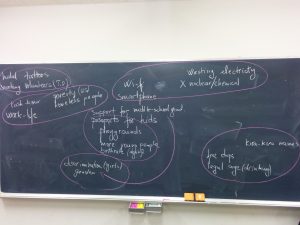Yesterday, I read an article about how Cambridge University students got trigger warnings related to the content of some the works they were supposed to read and discuss in class. Apparently, one of the persons in charge of the English lectures flagged any session containing material that could be deemed “upsetting” with a red triangle and an exclamation mark – including Shakespeare’s Titus Andronicus, among others. (The full article is here, on the BBC website.)
I read Titus Andronicus a long time ago and my memory is a bit fuzzy – I do remember some sexual violence in the play, but it’s about so much more than that. Power, control, politics, intrigues, plots… so much more. And even if it were about sexual violence, shouldn’t we talk about this? Isn’t that what the university is for? Isn’t that its mission? To talk about unpleasant things, to discuss them, to reflect on them, to try and understand them, to find a way to deal with them, to learn from them. Life is not always pink, and it’s never just black and white – it’s a whole spectrum of colors, and we must look at all of them.
I understand the lecturer’s concern that some of the students might find the content disturbing, upsetting, maybe even offensive. But I don’t think creating a bubble is the answer. It will never be. All those unpleasant things will still be out there, whether you flag them or not, whether the students feel upset or not – so shouldn’t we talk about them? Openly, passionately? Shouldn’t we take that risk?
Students deserve our trust. I don’t think they want to be pampered and protected – at least not all of them, not all the time. They want to learn from us, and not just knowledge. They want to learn how to think, they want to learn how to deal with violence, they want to learn how they can understand and change the world. They can find knowledge elsewhere, we should guide them so that they know what to do with it. Students deserve our credit. We just have to acknowledge them, and encourage them.
 In one of my English language classes, we discuss about what we would like to change in the world. We don’t have a textbook, we create our own. I ask students to think about a certain topic – something they would like to change – and then to discuss it with their classmates, to get feedback, and eventually to start writing a short essay about it. Then we do several feedback sessions on the successive drafts of the essay, just to make sure that everybody covers the topic from different angles, thinking about all the pros and cons, about the implications of any change in society, about their role, about their power. And the results are great: the essays are consistent, well structured and easy to read, and the topics are relevant enough for the whole class to engage in discussions.
In one of my English language classes, we discuss about what we would like to change in the world. We don’t have a textbook, we create our own. I ask students to think about a certain topic – something they would like to change – and then to discuss it with their classmates, to get feedback, and eventually to start writing a short essay about it. Then we do several feedback sessions on the successive drafts of the essay, just to make sure that everybody covers the topic from different angles, thinking about all the pros and cons, about the implications of any change in society, about their role, about their power. And the results are great: the essays are consistent, well structured and easy to read, and the topics are relevant enough for the whole class to engage in discussions.
So what do my students want to change in the world? Many things, as you can see on the board. From the way we interact with our smartphones to raising awareness about halal food in Japan, from the work-life balance to homeless people, from cultural attitudes toward tattoos to demographic problems. And they don’t shy away from sensitive issues: this semester, they want to talk about nuclear energy, gender roles and societal expectations, discrimination and so many other things. They are not afraid of the unpleasant – they want to face it. They don’t need trigger warnings flagging upsetting material, they just need trust. Our trust.